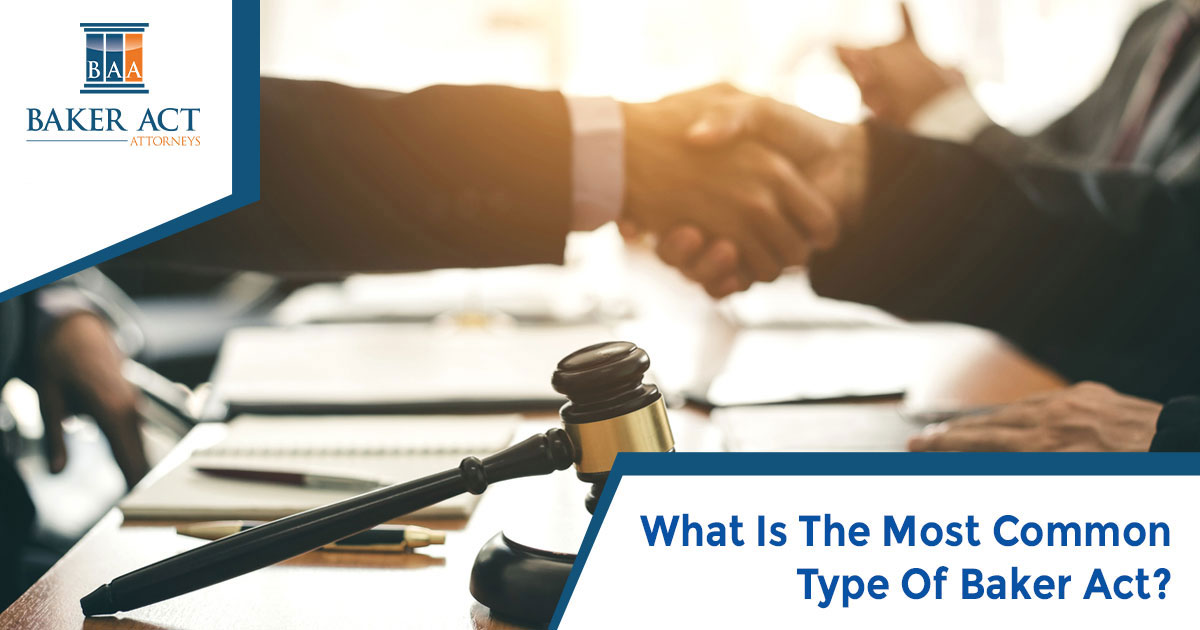The Florida Mental Health Act – commonly referred to as the Baker Act – was passed to ensure that people experiencing mental and emotional impairment to the extent that they are a risk to themselves and others are able to get the treatment they need. However, the Baker Act is frequently invoked inappropriately to detain people who pose no threat of harm to themselves or those around them.
In this article, an experienced Baker Act attorney shares the most common Baker Act cases and explains what family members can do if their loved ones have been wrongfully taken into custody under the Act.

A Brief Overview Of The Baker Act
The Baker Act was passed in 1971 to protect the rights and liberty interests of mentally ill people while ensuring the safety of the wider public. Prior to its enactment, many people – particularly elders – were confined to mental health facilities against their will without proper cause, experiencing significant trauma in the process. The Baker Act is designed to ensure that people can only be detained for psychiatric examination if certain requirements are met and sets strict timelines for how long they can be kept in custody. It also sets out the circumstances under which they can be committed for longer periods (this is called ‘involuntary placement’). However, although these laws are an improvement on previous mental health legislation in Florida, many Baker Act attorneys frequently experience the flouting of these strict requirements in the cases that they deal with.
What Are The Criteria For Involuntary Examination?
The most commonly invoked provisions of the Baker Act are those that deal with involuntary examination – that is, what people are referring to when they say someone has been ‘Baker Acted’. Involuntary examination is the process by which individuals are taken into custody by law enforcement and transported to a ‘receiving facility’ for psychiatric examination, where they can be held for up to 72 hours. Involuntary examination can be initiated by an ex parte court order issued by the circuit court following a petition by family members, by a law enforcement officer, and by a mental healthcare professional following an examination. In all three circumstances, the person being Baker Acted must meet the following criteria before they can be taken into custody:
- They are mentally ill, that is, they are experiencing mental and/or emotional impairment such that they are unable to control their actions or understand reality, and this impairment interferes with their ability to meet the demands of daily life; and
- As a result of this impairment, the individual cannot determine if they need a mental health examination, or they have outright refused an examination; and
- If they do not access treatment, they will likely suffer neglect to such an extent that they will experience substantial harm that can’t be avoided through the help of others, or there is a likelihood that without treatment they will cause serious harm to themselves or others.
Baker Act attorneys often find that family members, community workers and even law enforcement officers are unaware that section 394.463 of the Act expressly excludes people living with mental disabilities, suffering from substance abuse disorders, or experiencing intoxication. These categories of people are afforded assistance through other pieces of legislation, such as the Marchman Act, and do not qualify for involuntary examination under the Baker Act.
Common Misuses Of The Baker Act
Although involuntary examination under the Baker Act can offer an important intervention for some people, the most common cases Baker Act attorneys deal with are those involving the improper detention and examination of people who don’t meet the three criteria set out above. Let’s take a closer look at three common misuses of the Baker Act.
Accidental consumption of medication
The first case that attorneys commonly deal with is people who have accidentally taken too much pain medication or sleeping pills. It is fairly easy to take a few too many pills, especially if you are in severe pain. However, in several cases, people dealing with this issue are Baker Acted by the administrators at the hospital they go to, after medical professionals misunderstand their actions as an intentional overdose. Unfortunately, this trend has meant that many people who accidentally consume too much medication are scared to access the medical treatment they need.
Children experiencing behavioral issues
Sadly, many children with developmental disabilities are improperly Baker Acted when they are experiencing acute distress or overwhelm. In one case, a ten-year-old autistic boy who was having a difficult time after a family bereavement was handcuffed, detained, and taken to a receiving facility for involuntary examination when he became upset at school.
Over the past decade, thousands of Florida’s children have been seized and subjected to involuntary examinations under the Baker Act. While in some cases these interventions may be necessary to prevent children who are in immediate danger and at risk of harming themselves, in many cases, they do not meet the criteria for involuntary examination. Not only is wrongful Baker Acting traumatic for young children, but it can also leave their parents with expensive medical bills that they did not consent to.
People with substance abuse disorders
Another common type of Baker Act case attorneys encounter involves people being involuntarily taken into custody for mental distress resulting from substance abuse disorders. Given the express exclusions of the Act described above, this is an improper use of the Baker Act.
Families who want to help loved ones with addictions should instead consider filing a petition under the Marchman Act or applying for guardianship. While it’s very important that those with substance abuse disorders get proper treatment, the Baker Act is certainly not the way to go about it.
Factors That Heighten The Risk Of An Improper Baker Act Admission
In all three cases mentioned above, there are two further factors that can come into play that heighten the risk of wrongful detention and examination.
Health insurance
The first factor is health insurance. When an individual presents themselves at a hospital with stomach pains from taking too many pills (for example), and they have health insurance, they are more likely to be wrongfully Baker Acted. This is because the receiving facilities have a financial incentive to detain and examine individuals. The cost of Baker Acting someone is usually covered by a variety of sources, including the state, charities, insurance companies, and the individual who receives treatment. However, when someone has health insurance, unscrupulous facilities are motivated to detain patients for longer than necessary in order to charge higher bills to the insurance company.
Unscrupulous facilities
The risk of being wrongfully detained under the Baker Act is also determined by the receiving facility you attend. While some mental health facilities are staffed by experienced professionals who would never compromise their integrity for profit, other facilities are run by unscrupulous administrators who attempt to detain people for longer than necessary to charge expensive fees. In 2019, the Tampa Bay Times found that a certain facility had been exploiting hundreds of patients by detaining them longer than the 72-hour period allowed for in the Act.
What Can I Do If My Loved One Has Been Baker Acted?
If you suspect that your loved one has been wrongfully Baker Acted, you must contact a reliable Baker Act attorney as soon as possible. An experienced attorney will be able to help you secure the release of your loved one and ensure they receive the care and treatment they need.
If you do not act quickly, there is a risk that the facility administrator will file a petition at the circuit court requesting that your loved one be held for up to six months in terms of the Act’s involuntary placement provisions. This risk is especially present in circumstances where your loved one has health insurance or has been taken into an unscrupulous facility.
Not only could this be denying them the proper medical treatment they need – and the opportunity for them to have a say in this treatment – but it could also leave them with thousands of dollars in medical bills.
An Experienced Baker Act Attorney Is Here To Help
Mark Astor of Baker Act Attorneys has been helping Florida’s families with wrongful Baker Act cases for many years. Through his compassionate service, depth of legal skill, and strategic insight, he has assisted countless people who have been improperly detained for involuntary examinations.
Whether you’re considering Baker Acting your loved one and need legal advice or think a family member has been wrongfully detained under the Baker Act, Baker Act Attorneys should be your first call.
Contact us 24/7 at 855-429-0074 and we’ll ensure your loved one gets the assistance they need.

